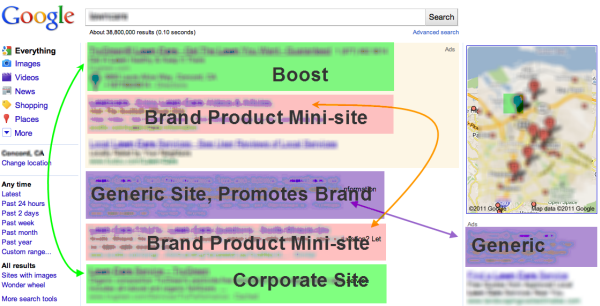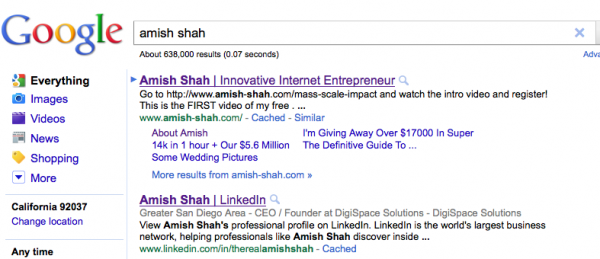If you follow the search “industry”, you’ve no doubt seen discussion concerning Google’s Panda update, and the aftermath that brand-less webmasters are left to fight through.
Aaron Wall has brilliantly described the plight of the small business owner, affiliate, and SEO. He has been throwing punches at Google and their seemingly hollow PR announcements that do not address what’s really going here . . . Google’s gonna make more money.
It’s competitive in this online world, and personally I don’t blame Google for any changes they’ve made. No reason to whine. It’s their world. We all just play in it.
The Changing Real Estate of the Search Result
One interesting change to key in on is the changing real estate of a Google search result. Google’s Adwords, Google Places, Google Comparison ads (coming to a money niche near you!), brand hotlinks, maps, and even a new page layout they are testing can be seen through the lens that these changes hurt click through rates on organic listings. They also hurt the variety of results shown to a searcher.
Truly, ranking #4 ain’t what is used to be. Just look at the difference in real estate these things take up, as per another of Aaron’s posts.
The search result of 2011 pushes many more organic results “below the fold”. In a world of near-instant gratification or dissatisfaction, if you get pushed down the page then you get less clicks. Simple.
This affects everyone from a nationwide mortgage bank to a dentist in Miami.
But this isn’t meant to be a treatise on why it’s happening. Just know it’s happening. It’s done.
In Some Ways, You’ll Always Be Safe
Despite the ongoing fear that Google can drive into the hearts of the small business owner or webmaster, there are subsets of search marketing that remain mostly untouched. You’ll be happy to hear that one of them applies to every company and every individual on the planet. That’s reputation management.
I know that first and foremost you care about the keywords that drive new, profitable traffic to your website. The “money” keywords. These are usually non-branded terms that describe your products our services. If you’re the dentist, it’s “Miami dentist”. If you’re the mortgage bank, it’s “home loans”. Unfortunately, those may be under siege.
The keywords I want to focus on for this argument are the ones in and around your name. Rightly, they require attention from an SEO standpoint just like the money-drivers. And if you look more closely, they often relate back to your bottom line more than you’d think.
Your Business Name, Your Personal Brand
An example. Say you run a local real estate shop. You have 4 agents in house and do all the usual marketing, both online and off. There are a few keywords like “carlsbad homes for sale” and “Carlsbad real estate agent” that drive good business, but are competitive.
But you also notice that some of your top 20 referring keywords include your company name or one of your agents’ names. Things like “rocksand realty”, “rocksand realty reviews” and “steve bastroli realtor”.
These are searches that could be performed by any variety of people. Current customers checking in your reputation. Journalists looking to do a story about local real estate pros who heard about you. Potential employees. People fed up with their current agent who saw your name on a flyer somewhere.
The point is, these are all valuable searches that can bring traffic to your site. Traffic that converts into dollars. And when I got to thinking about the implications of all that Google has done in the past few years to change the playing field of their search results, I realized little has changed on these searches.
A lot of valuable keywords for a small business involve searches for pretty pedestrian keywords. People’s names. People’s names + their job title. A company name + review. The tried and true strategies of publishing relevant content and building links to it still produce a successful end result when it comes to branded, or reputation, keywords.
Google’s Got Bigger Fish to Fry
There’s typically little profit in a third party putting their time and money into ranking for “steve bastroli”. Even “joe’s jeans review”, which there are some models to apply to that and rake in some money, should be free and clear for years to come.
So the process of running what many would dub an “online reputation management campaign” stays mostly safe in a world free from comparison ads or massive Adwords ad immigration.
You set the target keyword, produce content, build links, and watch the results dance like the old days. Big brands won’t notice, big brands don’t care. While there’s an element of discovering your business that might get more challenging in search, you can still own the results around your name like it’s 1999.
Nathaniel Broughton is a veteran internet marketer who’s helped produce three Inc 500 winning companies. He is the owner of SuretyBonds.com and Growth Partner Capital, a venture fund with services in SEO consulting, online reputation management, and premium link building.






